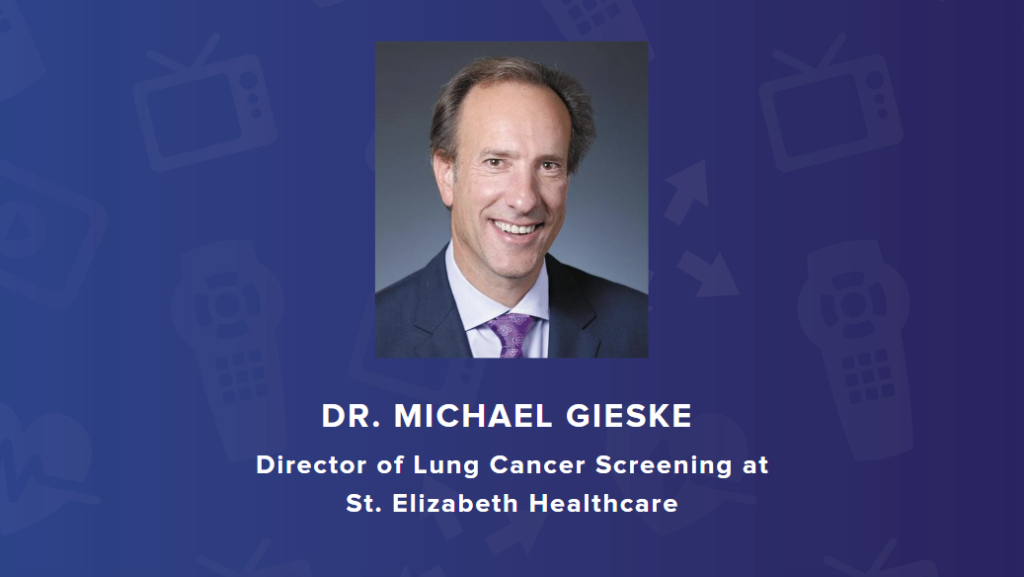
November is Lung Cancer Awareness Month. Recently we were able to interview Dr. Michael Gieske, the Director of Lung Cancer Screening and Physician Director of Virtual Health at St. Elizabeth Healthcare, about the topic. Dr. Gieske is passionate about raising awareness for lung cancer prevention and treatment. Lung cancer is the leading cause of cancer deaths in America. Dr. Gieske explained that lung cancer is the number one cancer killer in his home state of Kentucky. “I have seen a lot of patients and their families touched by lung cancer; it is such a devastating cancer because it is extremely aggressive. It moves quickly through the stages, and unfortunately, we usually do not find it until it is late in the stage of the disease. We find lung cancer about 50% of the time in stage four, and about 70 to 80% of the time in the late stages,” he said.
Patients diagnosed with the disease face the additional struggle of dealing with the stigma that exists about it, especially because many patients who are diagnosed with lung cancer are smokers or former smokers. “Nicotine is a very addictive chemical and for many years smoking was very fashionable. There is a certain sense even in the medical community, but certainly in the general community that smokers brought lung cancer upon themselves, and that if they get lung cancer, they deserve it. Nobody deserves lung cancer or really any tobacco-related diseases,” said Dr. Gieske. He explained that it is important to change the public perception of lung cancer. He expressed that although the public perception is negative about a lung cancer diagnosis, patients have a reason to feel more optimistic about their treatment if they receive one. "A lung cancer diagnosis is very different now. We are not only going after it and finding it earlier when the chance of survival in stage one can be greater than 90%, but even when we find lung cancer in the late stages, stage three and stage four, these patients are doing dramatically better than they did just five to 10 years ago,” he said.
He explained that patients of all stages are having better outcomes due to today’s treatment and screening options. “We’ve got patients now with stage three and stage four cancer that are walking around 15, 20 years later with no evidence of disease, and they probably have been cured,” he said.
Dr. Gieske expressed that new technology is a cause for hope when it comes to the disease. A new lung cancer screening test has been developed in recent years called the low-dose computed tomography (low-dose CT). This test gives doctors the ability to catch the disease in its early stages, where the chance for survival is much higher, and the likelihood of patients surviving 5 years or more is 60 percent. Dr. Gieske has led one of the most successful lung cancer screening initiatives in the country. As of September, of this year, his team in Kentucky has surpassed 28,000 low-dose CT screens, one of the top 4% of healthcare systems in the world. Dr. Gieske explained that when he was first asked to head up the thoracic oncology disease management team at St. Elizabeth’s Healthcare in 2016, he had to quickly get educated about the new treatment and screening options that were available. “I had no idea what they were talking about when they started talking about low-dose CT lung cancer screening, and I had never heard of it before. A landmark study was published in the New England Journal of Medicine in August of 2011, that really put lung cancer screening on the map,” he said.
He explained that although the test had been around for many years before the study was published, primary care physicians were not being taught about low-dose CT scans and these doctors were really the first line of defense in catching the disease early. “You know, we were not even taught to do lung cancer screenings, even though it has been around for more than 15 years, and it has changed a lot over the last several years. Lung cancer screening has been slow to catch on, partially because of the stigma and partially because of the nihilism,” he said.
“It's all about communication and education and it's not only for patients but for providers as well,” said Dr. Gieske. The combination of advanced communication, education, and technology is making a dramatic impact in the fight against lung cancer. Another type of technology that is being used to aid in the fight is patient engagement technology, such as Journey PX.
Linda Robinson, the Vice President of Clinical Excellence at MDM Healthcare explained how Journey PX’s patient engagement solutions allow patients to become more empowered through health literacy. “Only 12% of adults in the country are health literate. When we have patients within our care in the hospital, we have a captive audience, and we really must educate them. It put patients back into the driver's seat,” she said.
The Journey PX solution My Stay includes a vast education library that covers an extensive list of medical conditions and medications. Robinson explained how this solution works to help educate patients who are at risk for lung cancer. “It's targeted education, and it is integrated with the hospital’s EMR, so it knows if a patient is a smoker,” she said. “Our technology knows that if a patient has answered in Epic that they want to quit smoking, it can send them a video about how to create a quit smoking plan,” she continued.
Journey PX’s digital whiteboard My Day, Today closes gaps in communication inside the hospital room. Patients who desire to quit smoking will also have prompts appear on their digital whiteboard to watch individualized relevant education videos at their convenience. This is just one type of vital real-time information among many which is displayed on the My Day Today screen in a patient’s room.
Robinson explains why patient engagement technology is so beneficial. “While patients are in the hospital, they are getting the information that they need. Also, upon discharge it provides them with services and contacts once they get home so that they can continue their journey towards quitting smoking,” she said. Journey PX’s technology offers hospital patients several solutions to become engaged with their care. “Patient engagement technology is partnering with hospitals and care teams to enhance a patient's experience and ultimately this drives more positive outcomes,” said Robinson. As far as lung cancer awareness is concerned, this is hugely beneficial. As Dr. Gieske explained, education and communication are key for patients and care providers.
Finally. Dr. Gieske discussed his charity work, highlighting his involvement with the charity the White Ribbon Project, a non-profit organization dedicated to raising awareness about lung cancer by changing public perception of the disease. He explained that recently lung cancer survivors have started to become an important voice in the movement to educate the public about lung cancer awareness. “There is a growing population of advocates that are very willing to get out there and tell their story about how they beat lung cancer and they give hope to patients who are currently battling with the disease. “Once that message starts getting out it's contagious, there’s nothing stronger than word of mouth,” said Dr. Gieske.
You can hear more from Dr. Gieske about lung cancer awareness and treatment in our latest PX Space podcast interview. Read his full bio here which includes details about his involvement with charity organizations, awards, and more.
Listen to the full interview on the PX Space podcast available on Apple Podcasts, Spotify, and Amazon Music.


